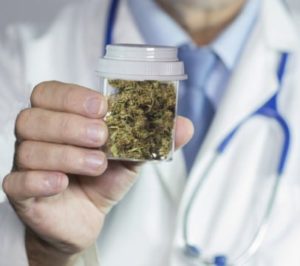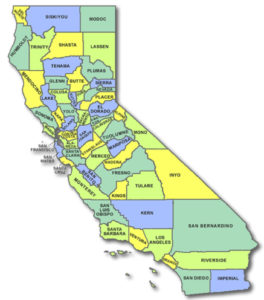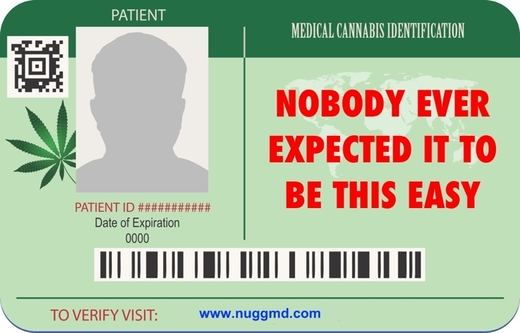What Is the Medical Marijuana Identification Card Program?
The MMIC Program was created under Senate Bill 420 (SB 420). It allows medical marijuana patients and caregivers to voluntarily enroll in the state’s online medical marijuana patient registry. In return, you’ll receive an identification card and patient ID number.
A MMIC allows you to legally prove you’re a certified patient or caregiver, as law enforcement officers have access to the database to prove an MMIC’s validity. Overall, it allows California to have a statewide, official, and uniform identification system to protect patients.
How Legislative Changes Affect Medical Cannabis Patients

While Proposition 64, which legalizes Adult Use cannabis in California, does have language regarding medical marijuana patients, it does not abolish the MMIC program.
Prop. 64 added new statutes to Section 5 of the Health and Safety Code, Use of Marijuana for Medical Purposes. The law made changes and clarifications regarding the MMIC program, including:
- Prop. 64 extends privacy protection for patients that have a valid MMIC. It ensures that all patient information is considered “medical information” and thereby protected under California’s “Confidentiality of Medical Information Act.”
- This act is similar to the federal Health Insurance Portability and Accountability Act (HIPPA).
- It continues the MMIC program and limits the fee to $100 per card. For Medi-Cal patients, the maximum fee is $50 per card. The law also allows a fee-waiver for indigent MMJ patients.
- Prop. 64 allows the California Department of Public Health (CDPH) to remain in charge of printing of MMICs and maintaining the medical marijuana patient registry.
- The law also allows individuals with a valid MMIC issued by CDPH to be exempt from retail sales tax on medical cannabis, medical cannabis concentrate, edible medical cannabis products, or topical cannabis.
- Patients must have their valid MMIC present at the time of purchase.
Currently, medical cannabis patients in California do not need an MMIC to purchase cannabis from a medical dispensary; all that’s needed is a valid doctor’s recommendation.
In 2018, this won’t change, except for the fact that medical marijuana patients will need a valid MMIC to avoid the retail sales tax on their medical cannabis purchases. So, the MMIC helps you save money, but you don’t need it to make medical purchases in general.
Benefits of Having Your Doctor’s Recommendation and MMIC
Having a cannabis recommendation and a MMIC affords several privileges that recreational users won’t have. These include:
1. No state sales and use taxes (Revenue and Tax Code 34011)–Prop 64 added language in section 34011 that keeps the state from taxing medical cannabis with the sales and use tax that recreational users have to pay. There will still be other taxes and local taxes, but many local governments won’t tax medical marijuana either.
2. Protection for parental rights (Health and Safety Code 11362.84)–People who use medical cannabis in accordance with Prop 215 can’t have their custody restricted based on this reason alone.
3. Protection from arrest if carrying more than one ounce (Health and Safety Code 11362.71(e))–People can still be arrested if the police believe that they are carrying more than their doctor would allow (like 30 lbs in their trunk) or they have other cause to believe they are violating the law. But they have to prove probable cause.
4. Larger possession limits (Health and Safety Code 11362.77(a))–Patients get to possess 8 ounces instead of just one ounce (28.5 grams).
5. Even larger possession limits if your doctor recommends (Health and Safety Code 11362.77(b))–It’s the law now that your doctor can recommend for you to possess even more.
6. Larger cultivation allowances in many jurisdictions–Local ordinances often make more allowances for medical cultivation than they do recreational. Also, in some places that don’t allow outdoor cultivation of recreational, they do allow outdoor medical cultivation.
7. Lower age limit for commercial medical purchases–If you are between 18 and 21, you’re still legally allowed to purchase commercial cannabis from a medical cannabis retailer or an adult cannabis retailer that also has a medical cannabis license.
8. Access to more dispensaries across the state–Many counties are only choosing to allow commercial medical sales, not adult-use sales.
How to Get a Medical Marijuana Identification Card in California

So far, we’ve discussed what the MMIC program is and what the benefits are of having a California state-issued, medical cannabis identification card.
Now the burning question is, how do you get one?
To get a medical marijuana identification card from the California Department of Public Health, you must be a California resident and diagnosed with a serious medical condition by a physician. Serious qualifying conditions identified under SB 420 include, but are not limited to:
- AIDS
- Anorexia
- Arthritis
- Cachexia (wasting syndrome)
- Cancer
- Chronic pain
- Glaucoma
- Migraines
- Persistent muscle spasm
- Seizures
- Severe nausea
- “Any other illness for which marijuana provides relief”
PRO Tip: Take note, there is persistent confusion around the language “any other illness for which marijuana provides relief.” While the CDPH states medical cannabis can be recommended for “any chronic or persistent medical symptom that either substantially limits a person’s ability to conduct one or more of major life activities,” an in-depth legal analysis indicates cannabis doctor recommendations are not bound by this language. While Senate Bill 420 (SB420) attempted to make stricter requirements for doctors issuing recommendations, Prop 215 is still the reigning legal king when it comes to interpretation. It even supersedes Prop 64 in this regard, given that Prop 64 states in its intents and purposes that it does not seek to challenge Prop 215. And since legislative intent trumps all when there is a dispute, and voter initiatives carry far more weight constitutionally than do senate and assembly bills, you can’t really define what medical conditions qualify for a medical card since Prop 215 was so intentionally vague. This is likely more than you need to know, but we believe in today’s day in age, it’s important that you get the full truth, and nothing but the truth.
The bottom line is that physicians in California are granted wide discretion to recommend cannabis as a treatment for any ailments they deem appropriate.
The physician must also agree that medical marijuana is an appropriate treatment option. Both the diagnosis and recommendation of medical cannabis as a treatment option must be documented in your medical records.
When you receive this medical recommendation from a physician, ask for a printed record for yourself. If you opt to get your recommendation online through NuggMD, you’ll receive a printed paper copy in the mail a few days after your consultation.
Once you receive a medical marijuana recommendation from a physician, you will need to fill out a Medical Marijuana Program Application/Renewal Form and submit it to the California county where you reside. You must include the following documentation with your application:
- A copy of your medical marijuana recommendation. You can get yours for $49 using NuggMD, California’s leading telemedicine platform. The process is easy, affordable and convenient.
- Legal proof of identity (valid California driver’s license or government-issued photo ID card).
- Proof of residency (rent or mortgage agreement, utility bill, or California DMV vehicle registration).
You must apply in-person at your county’s program. At your county’s program location (see the last section of this post to find your local department of health location), you will be required to pay a fee to receive your MMIC, which differs by circumstance of the patient and county. Medi-Cal beneficiaries will always receive a 50% deduction in the application fee and indigent patients who are eligible for County Medical Services will have the fee waived.
The final step is to take a photo for your Medical Marijuana Identfication card.
Once your application is submitted in-person, the county has 30 days to verify your application. If your application is verified, the county has five days to make your MMIC available to you.
Counties will either make MMICs available via mail or require the patient to come back into the county location to pick up their new identification card. This process varies from county to county, so while you’re applying at your local county office, we recommend asking about their pickup or mailing process if you’re approved
Please note that any missing information in your application can delay the process.
California Medical Marijuana Identification Card Program County Directory

Now that you know the steps required to get your MMIC and the benefits of doing so, it’s time to pull the trigger, right?
Regardless where you live in California, you must submit your application in-person to your county’s Medical Marijuana Program. The tricky part though, is that business hours and appointment requirements differ by county.
Please locate your county of residence in the directory below for a link to the program location and information on how and when to apply.
California counties are listed below in alphabetical order.
- Alpine County
By appointment only, call (530) 694-2146
Business Hours:
Monday, 1pm – 4:30pm
Wednesday, 1pm – 4:30pm
Friday, 1pm – 4:30pm
- Amador County
By appointment only, call (209) 223-6407
Business Hours:
Thursday 1pm – 4pm
- Butte County
No appointment necessary
Business Hours:
Thursday, 10am – 2pm
- Colusa County
*Not yet accepting applications
- Del Norte County
No appointment necessary
Business Hours:
Monday – Friday, 8am – 12pm; 1pm – 5pm
- El Dorado County
By appointment only, call (530) 621-6500
Business Hours:
Monday – Friday, 8am – 5pm
- Fresno County
By appointment only, call (559) 600-3434
Business Hours:
Tuesday, 8am – 12pm
Thursday, 12:30pm – 4:30pm
- Humboldt County
No appointment necessary
Business Hours:
Monday – Friday, 8am – 5pm
- Imperial County
No appointment necessary
Business Hours:
Monday – Friday, 9am – 12pm; 1pm – 4pm
- Kern County
No appointment needed
Business Hours:
Monday – Friday, 8am – 5pm
- Kings County
No appointment needed
Business Hours:
Monday – Friday, 8am – 4pm
- Lake County
No appointment necessary
Business Hours:
Tuesday, 10am – 12pm
Thursday, 10am – 12pm
- Lassen County
No appointment necessary
Business Hours:
Tuesday, 1pm – 4pm
- Los Angeles County
No appointment necessary
Business Hours:
Tuesday – Thursday, 8am – 12pm; 1pm – 4pm
- Madera County
No appointment necessary
Business Hours:
Mondays, 8:30am – 11:30am
- Marin County
No appointment necessary
Business Hours:
Monday – Friday, 9am – 12pm; 1pm-4pm
- Mariposa County
No appointment necessary except on Thursdays which are appointment only
Business Hours:
Monday – Friday 8am – 5pm
- Mendocino County
No appointment necessary on Tuesdays. By appointment only on Thursdays, call (707) 472-2784
Business Hours:
Tuesday, 2pm – 6pm
Thursday, appointment only
- Modoc County
By appointment only, call (530) 233-6311
Business Hours:
Monday – Friday, 8:30am – 5pm
- Mono County
By appointment only, call (760) 924-1830
Business Hours:
Monday – Friday, 9am – 5pm
- Nevada County
By appointment only, call (707) 253-4506
Business Hours:
Thursday, 2pm – 4pm
- Orange County
No appointment necessary
Business Hours:
Monday – Friday, 8am – 12pm; 1pm – 4pm
- Placer County
By appointment only, (530) 889-7158
Business Hours:
Monday – Friday, 8am – 11:30am; 1pm – 4:30pm
- Riverside County
No appointment necessary
Business Hours:
Monday – Wednesday, 7:30am – 12pm; 1pm – 3:30pm
- Sacramento County
By appointment only, call (916) 875-5345
Business Hours:
Wednesday 9am – 4pm
Friday, 9am – 4pm
- San Benito County
No appointment necessary
Business Hours:
1st & 3rd Tuesday of the month, 1:30pm – 4pm
- San Bernardino County
By appointment only, call (800) 782-4264
Business Hours:
Monday – Friday, 9am – 4pm
- San Diego County
No appointment necessary
Business Hours:
Monday – Friday, 8am – 4pm
- San Joaquin County
By appointment only, call (209) 468-3404
Business Hours:
Monday – Friday, 8am – 5pm
- San Mateo County
No appointment necessary
Business Hours:
Monday – Wednesday, 8am – 5pm
Thursday, 8am – 4pm
Friday, 8am – 5pm
- Santa Barbara County
No appointment necessary
Business Hours:
Monday – Friday, 9am – 11am; 1pm – 4pm
- Santa Cruz County
By appointment only, call (831) 454-3431
Business Hours:
Tuesday 1pm – 4pm
Wednesday 1pm – 4pm
- Solano County
No appointment necessary
Business Hours:
Monday – Friday, 8am – 3:30pm
- Sonoma County
No appointment necessary
Business Hours:
Tuesday & Wednesday, 9am – 3pm
- Stanislaus County
By appointment only, call (209) 558-7191
Business Hours:
Thursday 2pm – 4pm
- Sutter County
*Not yet accepting applications
- Tehama County
No appointment necessary
Business Hours:
Monday – Friday, 8am – 5pm
- Tuolumne County
No appointment necessary
Business Hours:
Monday – Friday, 8am – 5pm
- Ventura County
By appointment only, call (805) 981-5301
Business Hours:
Monday – Friday, 9am – 4pm
- Yolo County
No appointment necessary
Business Hours:
Monday – Friday, 8am – 5pm
Take Advantage in 2018
Getting a medical marijuana identification card in 2018 saves money, provides legal protection, has a lower age requirement, makes more dispensaries available available to you, and allows you to possess and grow more cannabis. It’s a no-brainer.
Learn more about the new cannabis laws and regulations and stay up-to-date with these articles:
- The Always Updated Guide to California Cannabis Regulations by County in 2018
- 2018 Brings New Challenges to the Federal Government’s Cannabis Law
- The Complete Q&A List for California’s 2018 Cannabis Regulations
- Jeff Sessions Rescinds the Cole Memo
Still confused? Don’t get frustrated! Just visit Nugg’s website and click the green chat-icon in the bottom-right hand corner to speak with a live cannabis expert who can answer your questions in real-time.




